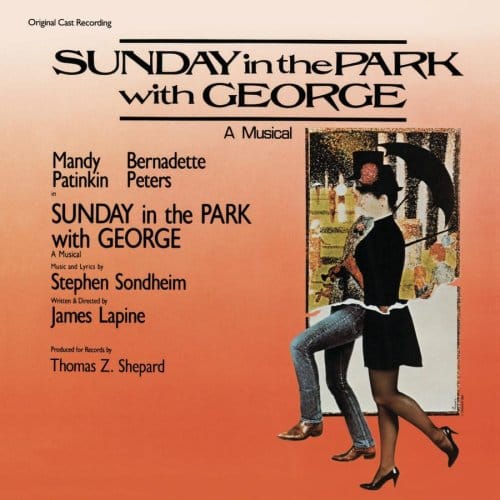Episodes: "Sunday" from Sunday in the Park with George

(We're talking musicals this week, which means it's time for the inevitable Stephen Sondheim post.)
It actually took me a while to warm to Stephen Sondheim. And by that I mean, "When I was 12 and listened to lots of original cast albums, I didn't really 'get' Sondheim." Which I think is probably a reasonable stance for a 12-year-old from the Midwest, but even then, I felt a kind of chip on my shoulder about my own inadequacy. It didn't help that I kept seeing terrible productions of Into the Woods (the Sondheim musical I still haven't entirely warmed to because of this), but performing in Sweeney Todd finally turned me almost completely around.
(Also, I have owned the cast album for this show all these years, yet am only just now realizing the cover depicts the painting in the top half and the modern day in the bottom half. Huh.)
Once I dove in, I dove in completely.
--
Let me start this over. I can do better.
--
I don't express emotions easily. I famously joke that I'm a robot to people who know me best, and my dislike of expressing anything other than very mild shifts almost led to the end of my marriage. There are a lot of reasons for this, chief among them a childhood in the Midwest and a kind of psychological closing off from myself, a compartmentalization I have only begun now to undo in my 30s, with the help of therapy and discussion with trusted friends.
And yet when I meet people who've read my work, either in person or online, they have a tendency to think that I'm some sort of mad maniac who sits beside his TV-watchin' chair with a big bucket in which to capture his tears. I was never quite sure about why this was, until my friend and former co-worker Sonia Saraiya told me that she had never assumed I was unemotional, regardless of how I described myself. No, she said, I just feel everything via my writing. That's where the emotion comes out.
Probably.
--
Not quite that either.
--
There were certain commenters at The A.V. Club who really got under my skin. There was the guy who assumed that when I said "we," I wasn't using a literary conceit but was, instead, trying to speak literally for him. There was the guy who got really mad about how much I didn't understand the wonder of the short-lived Bradley Cooper vehicle The Good Guys. And then there was the guy who signed all of his posts "Word" and thought that I had great potential I had squandered by taking on too many assignments, who felt that I had ruined my analytical skills by burying them beneath a constant string of personal ruminations that were of no interest to anybody but myself.
And, I mean, maybe! I go back and read stuff from that period and feel a little embarrassed by it, but I'm also not going to say that writing all of that flawed stuff (on very tight deadlines) didn't help make me into a better writer and, consequently, led me to where I am today, which is not fulfilled, exactly, but closer to where I want to be.
But the problem with "where I want to be" is that I've probably always had more of a literary bent than I probably strictly should for a critic. This is not to say that critics can't be beautiful writers (there are more than enough just working right now that prove otherwise), but it is to say that part of the trick of criticism is to rarely let that card drop until you've built up a rapport with the audience. Needless to say, I let that card drop early and often, and it gave away the game.
People sometimes ask why I go easy on stuff that doesn't work, and if I had to answer, it's because I think that creation is hard, and you're going to mess up. And when that happens, I'd rather try to understand what went wrong than drag it through the mud.
Though, Lord knows I'm not perfect on that score.
--
Still not there.
--
Somebody — I think it was Joss Whedon? — said that Sunday in the Park with George, my favorite Sondheim musical, came in two very different pieces and acts, because the first (about the creation of the famous painting A Sunday Afternoon on the Island of La Grande Jetee by Georges Seurat) is about the burden of being a genius, while the second (about Georges' grandson) is about the burden of not being a genius.
That sentiment struck me to my core, because I think all artists (yes, even critics) hope they're the former but are secretly certain that they're the latter. Me, too.
--
Closer.
--
"Sunday" is about living forever. It is about the idea that if you create something perfect and beautiful enough, you can reach out from the past and tell future generations that you were someone who existed, not just another smudge in the existence of the universe. It's about how the act of creation is an attempt to make a world that will stand as your handiwork, and I love how the original cast recording includes its own imperfections, like a child whose slightly flat singing throws off the punishingly long notes that make up the song.
You can, if you work hard enough, assemble the future self that others will remember after you die. But most of us won't. We'll be reduced to those smudges, and maybe if we're lucky, our descendants will encounter us as a point of data that hopefully helps them make sense of themselves. But probably not.
When I look back at my earliest work, I see, often, how terrified I was of dying without fulfilling some part of myself that I didn't wholly understand. Now, I think I see it more clearly, this notion of leaving a legacy, but I also don't know how one does that. Even those who achieve great fame and success in their lifetimes may be forgotten utterly by history. We do not, ultimately, get to write our final story, no matter how hard we try.
And yet we try, however we must, passing through arrangements of shadows. We send messages to the future, tossed in bottles into an ocean of time, with no guarantee they'll be found by anyone. Most likely they won't, but maybe they'll wash up on some far-off shore we still cannot see.
--
Order. Design. Tension. Balance. Harmony.
--
Forever.
--
Episodes is published daily, Monday through Friday, unless I don't feel like it. It is mostly about television, except when it's not. Suggest topics for future installments via email or on Twitter. Read more of my work at Vox Dot Com.




